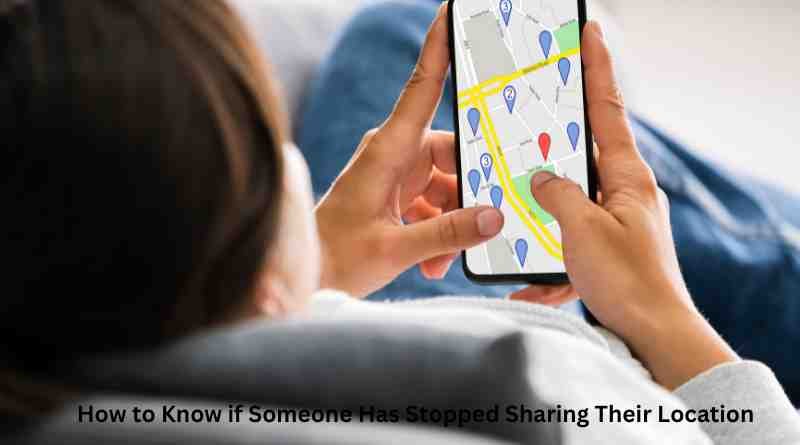How to Know if Someone Has Stopped Sharing Their Location: A Complete Guide to Detecting Changes
In today’s digitally connected world, sharing your location with family and friends has become a common practice. It provides a sense of security and convenience, allowing loved ones to keep track of each other’s whereabouts. However, there may come a time when someone stops sharing their location, and this can raise concerns or lead to misunderstandings. Understanding how to detect these changes can help you manage your relationships better and ensure everyone’s safety. This guide will explore various methods and tools to determine if someone has stopped sharing their location, and what you can do about it.
Understanding Location Sharing
Location sharing is a feature available on many smartphones and applications, allowing users to share their real-time geographical location with others. It is commonly used on platforms such as Apple’s Find My, Google Maps, and various social media apps. This feature can be particularly useful for parents monitoring their children, friends meeting up in busy areas, or partners ensuring each other’s safety.
When someone shares their location with you, you can usually see their real-time movements on a map. However, there are several reasons why someone might stop sharing their location. It could be due to privacy concerns, technical issues, or a deliberate choice to turn off location services.
Signs That Someone Has Stopped Sharing Their Location
Inactive Location Updates
One of the most obvious signs that someone has stopped sharing their location is the lack of updates on their position. If you notice that the person’s location hasn’t updated for an extended period, it could mean that they have turned off location sharing. Most location-sharing apps provide real-time updates, so a stagnant location pin can be a clear indicator.
Notifications from Location Sharing Apps
Many location-sharing apps send notifications when someone stops sharing their location. For instance, Apple’s Find My Friends will notify you if a person has stopped sharing their location with you. Similarly, Google Maps may send alerts indicating that location sharing has been disabled. Pay attention to these notifications, as they are designed to inform you of any changes in sharing settings.
Checking Settings on Shared Apps
If you suspect someone has stopped sharing their location, you can check the settings on the app where the sharing was enabled. For example, on Find My, you can see the list of people who are currently sharing their location with you. If the person’s name is no longer on the list, it’s a clear sign that they have stopped sharing their location. On Google Maps, you can navigate to the location sharing section to see active shares.
Reasons Why Someone Might Stop Sharing Their Location
Privacy Concerns
Privacy is a significant reason why someone might stop sharing their location. They may feel uncomfortable with others knowing their every move or may have concerns about their data being tracked. In such cases, it’s essential to respect their decision and have an open conversation about their privacy preferences.
Relationship Dynamics
Changes in relationship dynamics can also influence location-sharing habits. For instance, if there has been a fallout or misunderstanding, someone might choose to stop sharing their location as a way to create distance. It’s important to address any underlying issues and understand the context behind their decision.
Technical Issues
Sometimes, technical issues can cause location sharing to stop unexpectedly. These could include problems with the app, a device’s GPS malfunctioning, or connectivity issues. Before jumping to conclusions, ensure that there are no technical problems causing the disruption.
Deliberate Choice
There are times when someone might deliberately choose to stop sharing their location for personal reasons. They might need some privacy or a break from constant connectivity. It’s crucial to have empathy and understand their need for personal space.
How to Address the Situation
Open Communication
The best way to address this situation is through open communication. Talk to the person and express your concerns without sounding accusatory. Ask them if everything is alright and if they intentionally stopped sharing their location. Understanding their perspective can help you navigate the situation better.
Respect Their Privacy
If the person has stopped sharing their location due to privacy concerns, it’s important to respect their decision. Everyone has the right to control their personal information, and pushing them to share their location against their will can strain your relationship.
Check for Technical Issues
Before concluding that someone has stopped sharing their location intentionally, ensure there are no technical issues. Ask them if they are experiencing any problems with their device or the app. Sometimes, a simple reboot or app update can resolve the issue.
Alternative Ways to Stay Connected
If someone has stopped sharing their location but you still want to ensure their safety, discuss alternative ways to stay connected. Regular check-ins via calls or messages can be a good compromise. This way, you can respect their privacy while still maintaining a sense of security.
Tools and Apps for Location Sharing
Apple’s Find My
Apple’s Find My app is a popular choice for location sharing among iOS users. It allows you to see the real-time location of friends and family members who have chosen to share their location with you. The app also provides notifications if someone stops sharing their location, making it easier to detect changes.
Google Maps
Google Maps offers a location-sharing feature that works across both Android and iOS devices. Users can share their real-time location with specific contacts for a set period or indefinitely. Google Maps also provides notifications and status updates about location sharing.
Life360
Life360 is a family-oriented app designed to keep track of your loved ones. It offers real-time location sharing, driving reports, and emergency alerts. Life360 is particularly useful for families with children, as it provides detailed insights into their whereabouts and safety.
Social Media Apps
Many social media platforms, such as Snapchat and Facebook Messenger, offer location-sharing features. These can be used to share your location with friends and family temporarily. However, these platforms may not provide as detailed information as dedicated location-sharing apps.
Conclusion
Knowing if someone has stopped sharing their location can be crucial for maintaining trust and ensuring safety. By understanding the signs and reasons behind such changes, you can address the situation thoughtfully and respectfully. Open communication, respect for privacy, and the use of reliable location-sharing tools can help you navigate this aspect of digital relationships effectively. Whether it’s a temporary glitch or a deliberate choice, being informed and empathetic will always lead to better outcomes.
Read also: check




